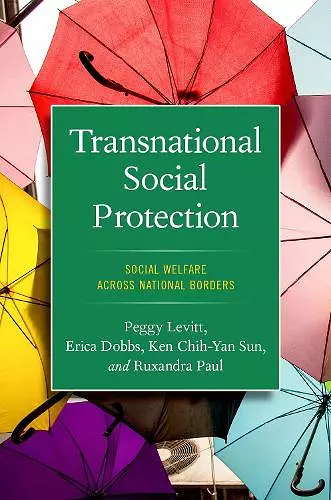Transnational Social Protection
Social Welfare across National Borders
Peggy Levitt author Ken Chih-Yan Sun author Ruxandra Paul author Erica Dobbs author
Format:Paperback
Publisher:Oxford University Press Inc
Published:11th May '23
Should be back in stock very soon
This paperback is available in another edition too:
- Hardback£84.00was £84.00(9780197666821)

This book explores the emergence of transnational social welfare arrangements that challenge traditional models based on citizenship, examining how migrants navigate protections across various settings and the implications for national systems.
Transnational Social Protection explores the evolution of social welfare systems in light of increasing global mobility. The authors, Peggy Levitt, Erica Dobbs, Ken Chih-Yan Sun, and Ruxandra Paul, argue that traditional notions of social rights, which are tied to national citizenship and residence, are becoming outdated. As more individuals live, work, study, and retire outside their countries of citizenship, the authors examine the implications for social welfare provisions.
The book introduces the concept of the resource environment, illustrating how migrants and their families navigate a complex landscape of protections from various sources. This approach highlights the diverse ways in which social welfare can be accessed and pieced together, depending on the specific contexts of individuals' lives. The authors emphasize that these arrangements are not uniform; they vary significantly across different locations and times, reflecting the dynamic nature of social protection in a globalized world.
Ultimately, Transnational Social Protection presents a new framework for understanding social welfare that transcends national boundaries. The authors detail how a hybrid transnational social protection regime has emerged, complementing or sometimes replacing traditional national systems. By examining the impact of migration and mobility on social welfare, the book encourages readers to rethink the future of social protection in an increasingly interconnected society.
This book moves the field forward in several ways. First, it asks important central questions: How do people gain access to social protections within the context of migration? How do they negotiate such protections for themselves and their families as they reside in places offering markedly different levels of or exclusion from state offered social protection? or as they move through the life course? Second, it uses but also notes how much prior research on transnationalism or state-centered social protections cannot fully describe how migrants and their families seek to access such social protections. Finally, and critically, they use empirical fieldwork-based evidence to describe and analyze how these families create resource environments seeking access to social protections. They effectively ground and develop their theoretical arguments with data and cases. An important contribution. * Robert Smith, Baruch College and Graduate Center, CUNY *
This book is the first that introduces a framework to analyze how migration reconfigures social protection transnationally, and what policy and social changes are needed. Based on a wide range of empirical cases from across the world, this pioneering synthesis is an important intervention into the global debates on social welfare now. * Biao Xiang, Max Planck Institute for Social Anthropology *
Individuals in the transnational world painstakingly documented in this book can no longer triangulate based on citizenship, geography, or even local community. Whether in the area of political rights, education, health, or work, the authors provide salient and sobering insight into what determines social welfare for the millions of people without residence. * David Weil, Heller School for Social Policy, Brandeis University *
This book is an essential reference point in academic and policy debates on transnational social protection and the need to rethink the structures for the provision of social welfare and access to rights across borders given the realities of human mobility in a global context of neoliberalism, inequality, deindustrialization and austerity. * Alexandra Délano Alonso, Associate Professor of Global Studies, The New School *
More and more people are citizens of one country but live and work in another. How do they obtain social protections? How do they manage the vagaries of work, health, and the law? What roles are played by governments, communities, non-profits, families and friends? In Transnational Social Protection, Levitt, Dobbs, Sun, and Paul provide deeply researched answers to these questions. They develop the idea of Hybrid Transnational Social Protections (HTSP) and via case studies and data offer new and compelling insights on migration from the perspective of families struggling to make do in a complicated world. * Paul Osterman, NTU Professor, MIT Sloan School *
This book is a must-read for scholars and practitioners struggling to make sense of the 'triple-win' migration and development discourse. It offers a transnational multi-sectoral approach to thinking afresh about the roles of states, markets, the third sector, and social networks and families in securing migrant rights and protections in a world fragmented by the power of economic nationalism. * Brenda Yeoh, National University of Singapore *
The great increase in migration today poses one of the greatest challenges to the nation-state as a basis for social policy. Sociologist T. H. Marshall posited an extension of citizens' claims on their national governments as a historical progression in individual-social relations. Recommended. General readers through faculty; professionals. * Choice *
ISBN: 9780197666838
Dimensions: 235mm x 158mm x 15mm
Weight: 363g
240 pages